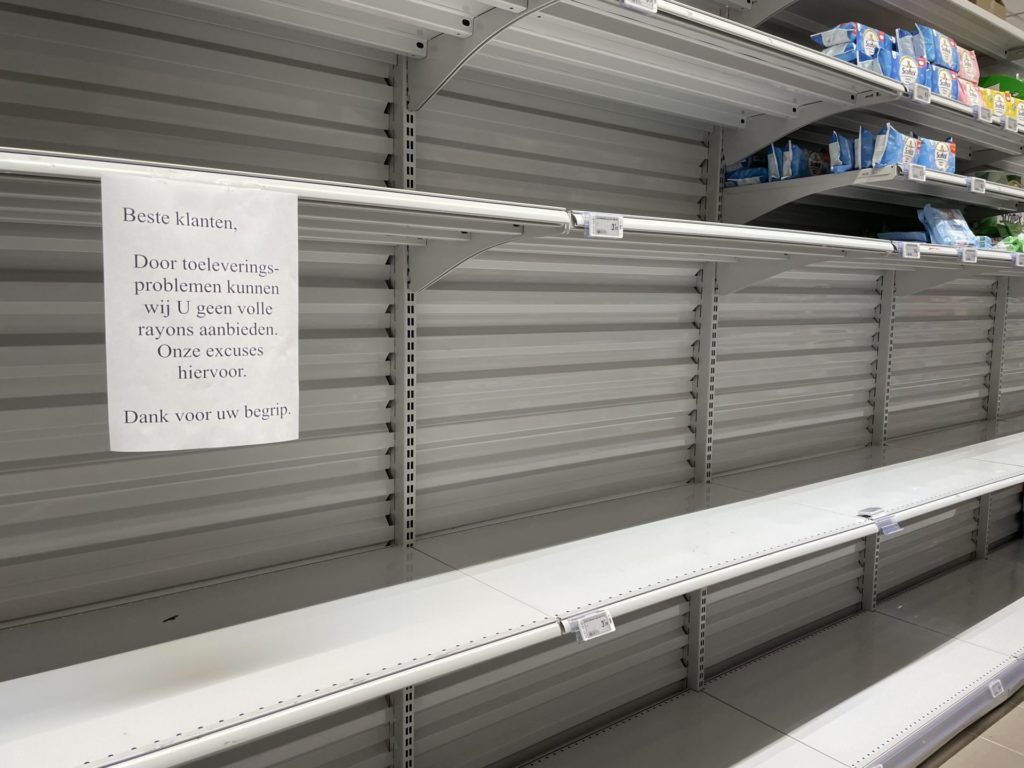Carrefour continues to struggle with empty shelves, despite the fact that the strike at the distribution centre in Nivelles has been over for a week, according to reporting from De Standaard.
A shortage of drivers is said to be the main cause for empty spots on shelves now.
The issue is especially in Brussels stores, but shortages extend to Flanders, as well.
“The supply of our shop is completely out of order,” a manager there told De Standaard anonymously.
“We get far too few goods delivered. Last week we were told again that there is one truck less a week coming. It was supposed to bring more in one go, but so far that is not the case at all. For example, last Thursday I placed a large order that was to be delivered the following day. Now it's a week later and only a third has been delivered.”
Signs printed and posted on the empty shelves apologise to customers for the inconvenience, with some in Brussels directly blaming the strike at the Nivelles depot in Wallonia.
The shortages span a range of items, from fresh food and wine to dry food and items like toilet paper.
“If it continues like this, I fear for the holidays,” said the manager in Flanders.
Carrefour spokesperson Aurélie Gerth told De Standaard the company is annoyed with the situation and is doing everything possible to solve the problems, but that they’re “dependent on our logistics partner Kuehne+Nagel who runs the distribution centres.”
Gerth said they “cannot offer any certainty as to when this will all be resolved.”
Related News
- Share of over-55s working in food sector has doubled in ten years
- Empty shelves: Carrefour Belgium confirms supply difficulties
Trade union members went on strike in Nivelles because of plans to close the depot, laying off 549 employees and having branches in Kontich and Willebroek (both in Flanders) pick up the slack.
The depot will now remain open, and “the strike has been over for a week now,” according to Pascal Strubbe of the socialist BBTK union.
“A lot of people here are now on temporary unemployment because there is too little work,” he says. “Kuehne+Nagel prefers to continue working at its depot in Kontich. Also the truck drivers of Supertransport in Nivelles, who drive for Carrefour and who also had to lay down their work, are back at work.”
Stubbe said that during the strike, Carrefour tried to stock its shops mainly from Kontich, but that depot couldn’t handle the extra volumes, which he says proves that Nivelles is still needed.
But trade unions in Kontich say they’re not entirely to blame, either, pointing to a shortage of truck drivers coming to collect the deliveries they’ve prepared.
“There are not enough lorries to collect the goods at the loading bay. It is now full to bursting with pallets,” Wannes Gielis of ACV Puls told De Standaard.
Carrefour generally outsources its transport to Supertransport of Jost Group, which Gielis says doesn’t have enough drivers to do the extra runs.
Tom Peeters, secretary-general of the transporters' union BTB, would agree.
“There is a big shortage of drivers in Belgium,” Peeters said.
“The influx of young people is too low, while many drivers are retiring. On top of that, chains like Carrefour put a lot of pressure on prices and wages, which makes the profession of driver even more unattractive. Jost Group mainly works with cheap Romanian drivers.”
Peeters predicts that situations like what’s happening in the UK, where a driver shortage is rapidly worsening, will soon spread to mainland Europe, starting with the Netherlands.
It’s a worry shared by the Carrefour manager in Flanders: that these problems aren’t temporary, but structural, and will ultimately cost him customers.

